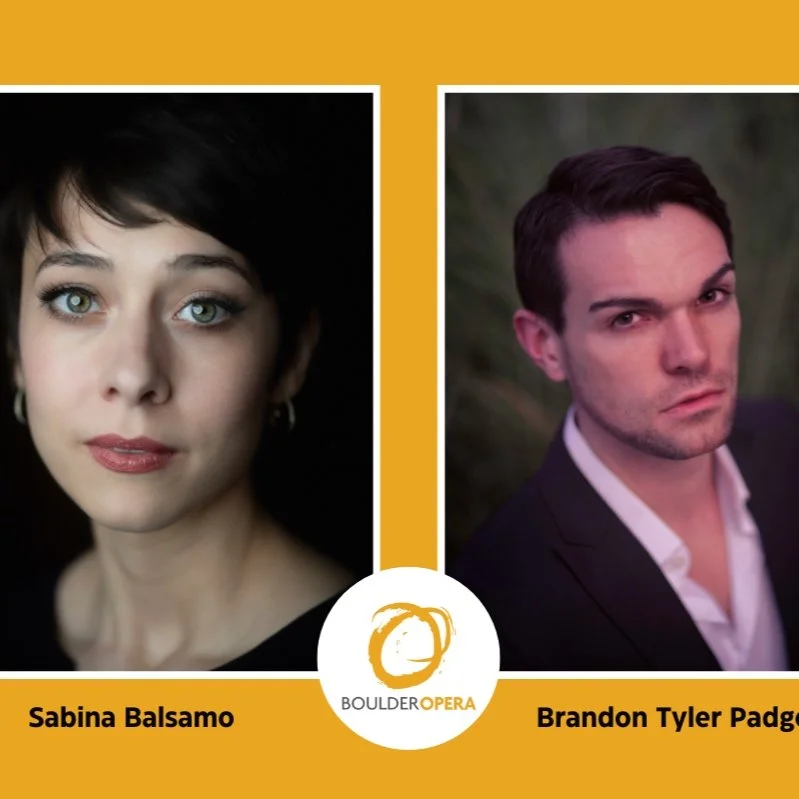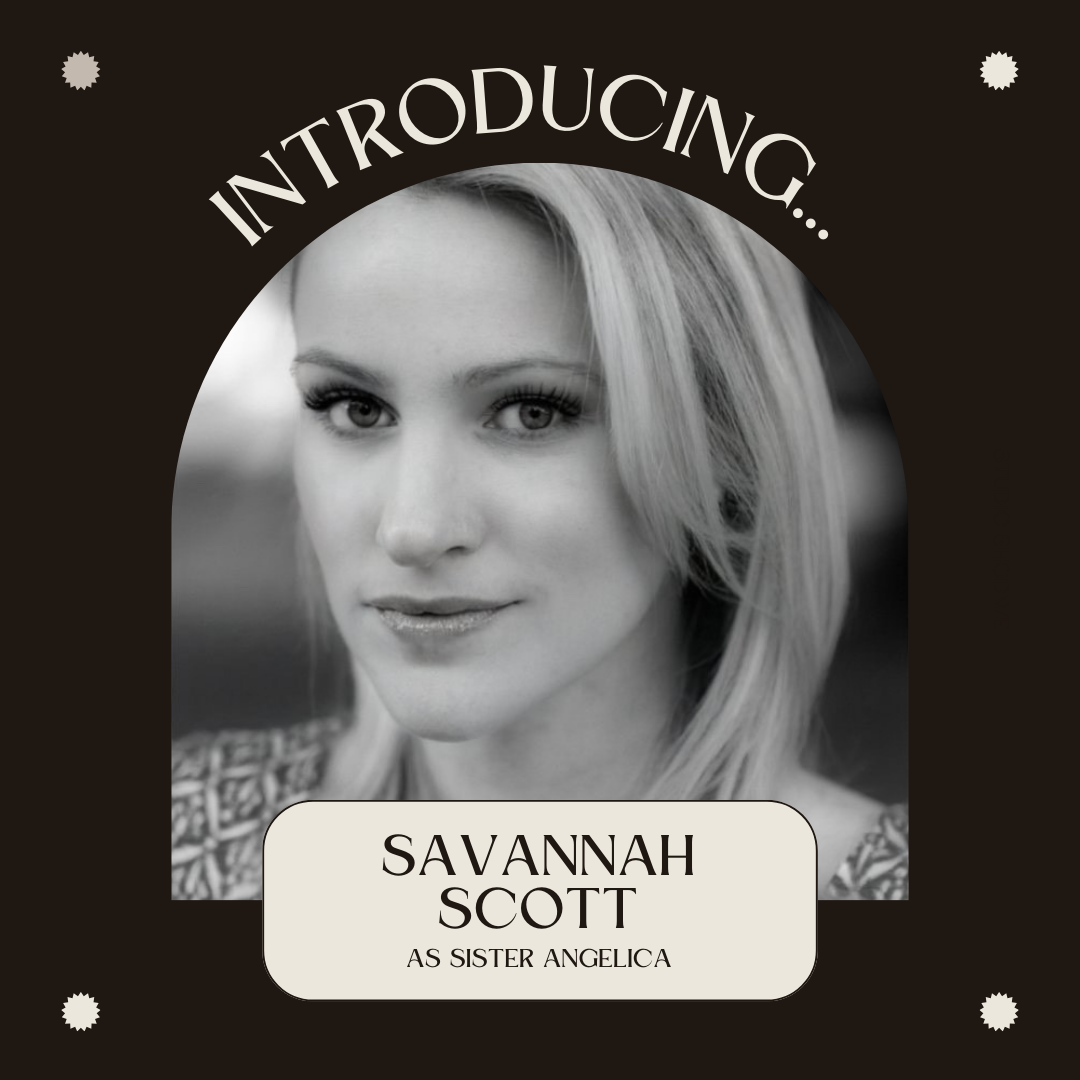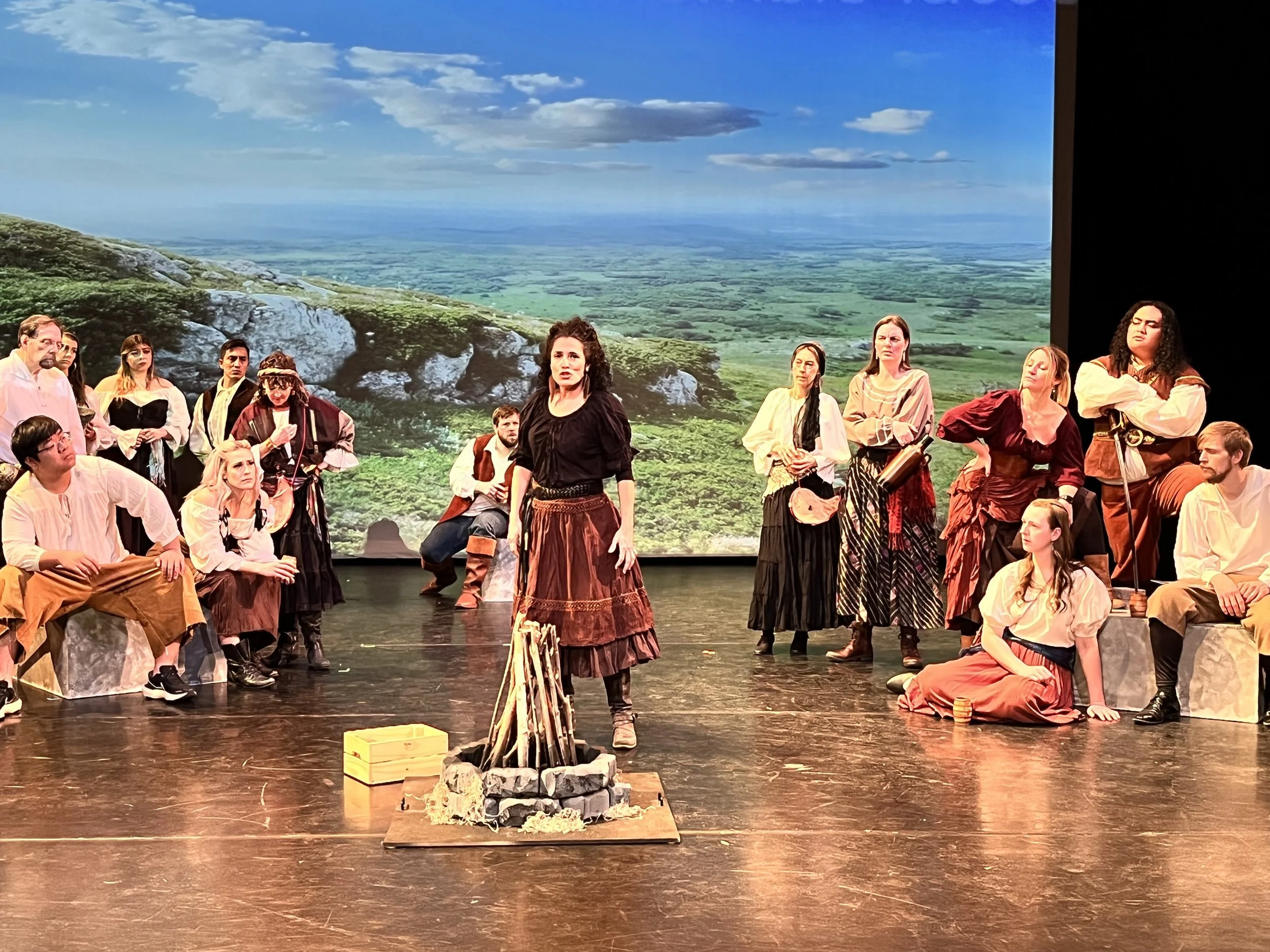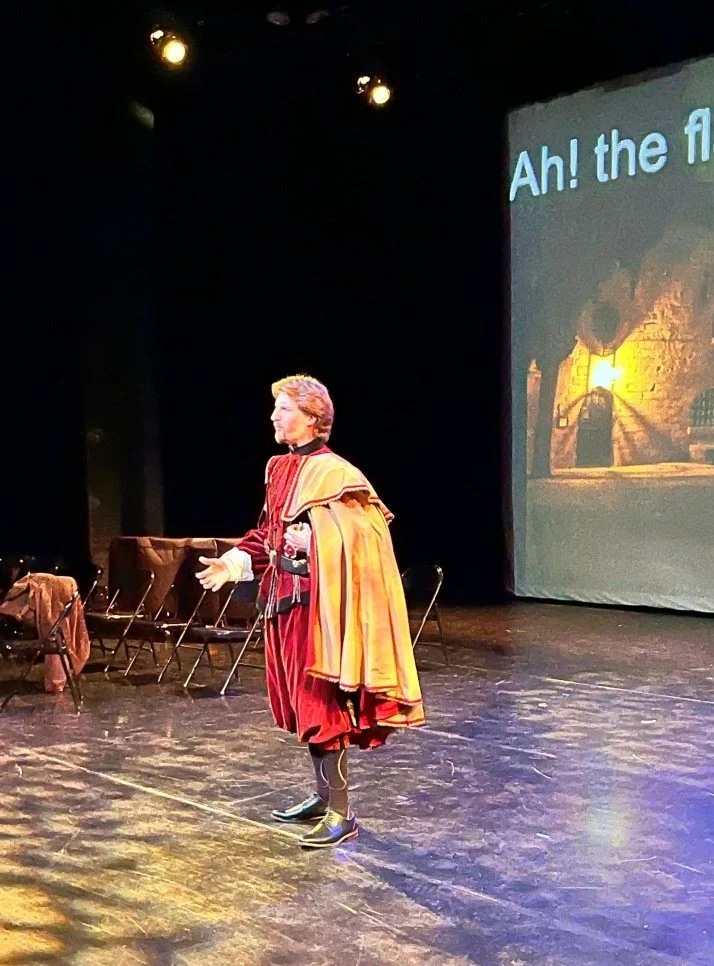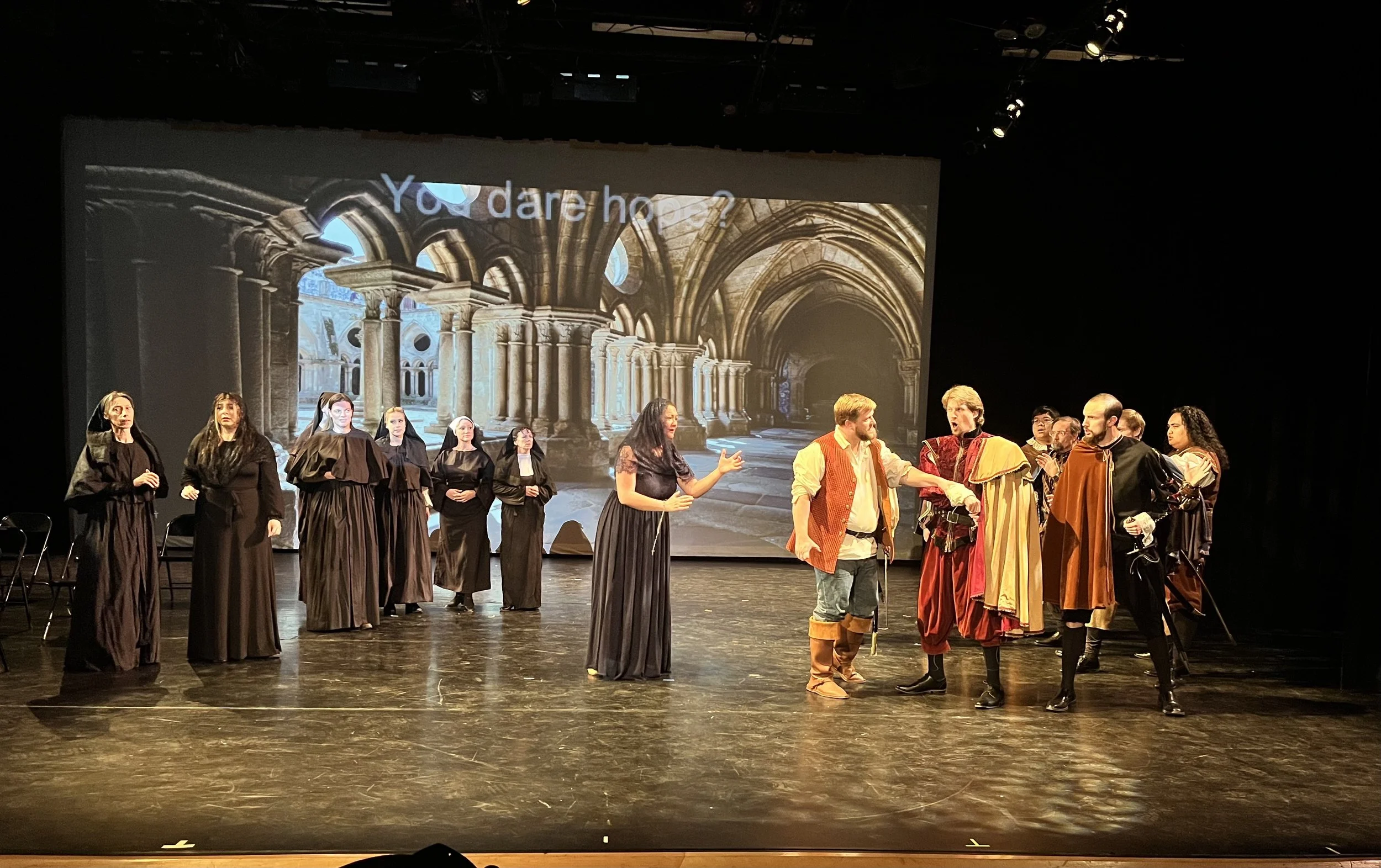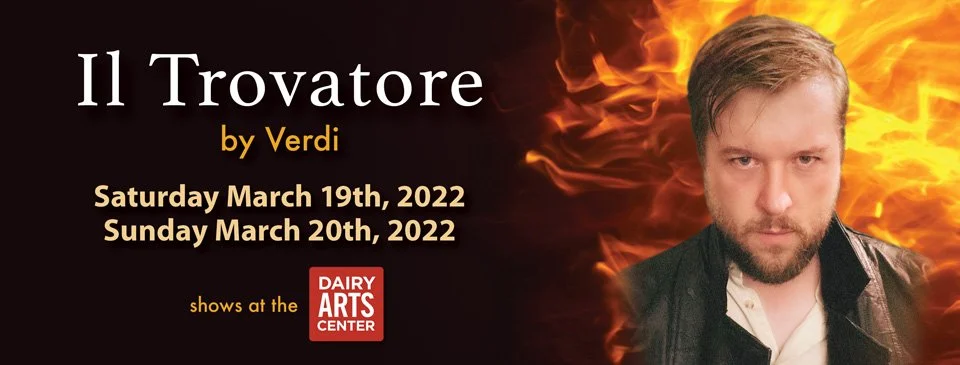Boulder Opera Company had the privilege to interview Ilan Blank, a local composer and recent graduate from CU. Blank's The Spare Room with a Shag Rug will be showcased in our upcoming performance, Operatizers. Tune in as Blank explains the inspiration behind his creation, how history influences his storytelling and more fascinating insights.
Brandon Tyler Padgett and Sabina Balsamo fill the positions of both performers and stage directors for Boulder Opera Company’s Operatizers.
Mario Barbosa serves as the music director of three of Boulder Opera Companies' shows, including our upcoming dinner opera production, Suor Angelica.
Savannah Scott is set to take center stage in the Boulder Opera Company’s dinner opera production of Suor Angelica by Puccini.
Suor Angelica by Puccini was crafted a century ago and stands as a notable piece of artwork due to its emotional depth and poignant music. Native New Yorker, Helen Van Tine-Golden is set to direct her interpretation of this one-act opera Suor Angelica at Dickens Opera House. Van Tine-Golden describes Suor Angelica as a tiny gem of verismo opera. “Suor Angelica is an opera where the most glorious orchestra and melody are written in celebration of the female voice and psyche,” said Van Tine-Golden. In an exclusive interview, Van Tine-Golden sat down with us to discuss the highly anticipated Dinner Opera: Suor Angelica, taking time out of her busy schedule to share her insights.
Puccini's inspiration to write Suor Angelica came from his sister, who joined a convent. Puccini was a frequent visitor and benefactor of his sister's convent. “The impetus to all his operas was a play he saw, a story he read, or observations from the lives of people he encountered, that moved him deeply to compose operas that matched the emotional complexities he felt about the characters and their stories,” explains Van Tine-Golden. While the specifics of what Puccini witnessed at his sister’s convent remains unknown to this day, Suor Angelica held a special place in his heart among the three one-acts he wrote.
The story of Suor Angelica is very human. Van Tine-Golden says that the characters in Suor Angelica are too complex to be characterized as ‘good’ or ‘bad.“The backstory and motivations for Suor herself, the nuns, and the Principessa are inferred from what they say, how they act, and the color of the music. Just like in everyday life, we glean what we know -or think we know -about people by what the little things that they say and do stir up in us - good and bad.”
In the words of Puccini, “I told you that I always wanted to make people cry: that’s all. But do you think it is easy? We have to find a story that holds us with its poetry, it's love and suffering, and inspires us to the point that we can get an opera out of it.” Van Tine-Golden aims for her audience to fall in love with her production of Suor Angelica. “It's humanity and the celestial music.” She went on to say that she welcomes tears from her audience, “And, if you cried at the end, like Mr. Puccini wanted you to, all the better. Then take every opportunity they can to see and hear all of Mr. Puccini's works, as well as all the great operas, old and new.”
Dramatic soprano Stefanie Anduri will portray central character Brunnhilde in Boulder Opera Company's Opera in the Park production of Scenes from Der Ring on July 29th in Boulder, Colorado.
At Boulder Opera, we are excited to announce that Gene Roberts will be joining our team once again to direct our production of Massenet’s Manon.
At Boulder Opera, we are excited to announce that Steven Aguiló-Arbues will be joining our team once again to conduct our production of Massenet’s Manon.
At Boulder Opera, we are excited to announce that Brandon Tyler Padgett will be joining our team once again to direct our production of Humperdinck’s Hansel and Gretel, as well as sing the role of Father.
Performances will be at the Dairy Arts Center March 19 and 20.
By Izzy Fincher March 15 at 12:15 p.m.
What is the secret to pulling off Verdi’s Il trovatore? According to the Italian tenor Enrico Caruso, it’s easy—as long as you have “four of the greatest singers in the world.”
As part of their 10th Anniversary Season, the Boulder Opera Company will present Il trovatore (The troubadour) March 19 and 20 at the Dairy Arts Center. With scenic projections, a reduced orchestra and a chorus, this four-act opera is one of the company’s most ambitious, large-scale productions to date.
Azucena (Dianela Acosta) in the Boulder Opera production of Verdi’s Il Trovatore
Il trovatore is a hard opera to present, with four principal roles that require large, dramatic voices and demanding vocal techniques. This is especially true for the lead female characters. The Romany woman Azucena (played by Dianela Acosta) needs a lyrical yet dramatic mezzo soprano with a large range, while noblewoman Leonora (Michelle Diggs-Thompson) needs a coloratura soprano voice that is both flexible and hefty.
“Now that I have been singing for a while, I think that Verdi has kind of settled in my voice,” Diggs-Thompson says. “I don’t think I would have been able to pull off this role 20 years ago.”
Beyond this, the opera poses an artistic challenge—that of bringing to life an impossibly melodramatic storyline with twisted characters in a relatable way. Set in 16th-century war-torn Spain, this blood-curdling tale of revenge features burning babies, kidnapping, beheading, gypsy curses and death by poison.
Premiered in 1853, Il trovatore is a part of a group of three operas by Verdi, along with Rigoletto (1851) and La traviata (1853), that represented a fundamental shift in his dramatic style. Il trovatore is based on Spanish playwright Antonio García Gutiérrez’s first commercial success, El trovador (The troubadour) of 1836.
For the adaptation, Verdi worked with prolific librettist Salvadore Cammarano, best known for Donizetti’s Lucia di Lammermoor. In his correspondence with Cammarano, Verdi urged the playwright to stay true to the sensationalism in the original play, stating “the more unusual and bizarre the better.” Initially, he wanted to call the opera La zingara (The Gypsy), in honor of Azucena, who is at the heart of the melodrama.
The Count di Luna (Karl Butterman)
The plot centers around a twisted love triangle. In the kingdom of Aragon, Count Di Luna (Karl Butterman), a nobleman in the service of the prince, is madly in love with Leonora, one of the Queen’s noblewomen. But she is in love with another man: Manrico (Nathan Snyder), a troubadour and officer in the army of the Prince of Urgel and Azucena’s son, who is leading rebel forces against the monarchy.
“Manrico is a hot-head,” says Snyder. “Verdi writes him in such a bombastic way. It’s electrifying.”
“This story is so powerful (because) it deals with three faces of love,” stage director Gene Roberts says. “It deals with romantic love at the center of the story. It deals with the fierceness of a mother’s love and how that lasts over many years. But the one that seems to be the most powerful in this story and the undoing of everyone is obsessive love.”
But what drives the opera forward is a thirst for revenge, which is introduced in the convoluted backstory. Years ago, a Romany woman set a curse upon Di Luna’s infant brother, causing the child to become sick. The Count had the woman burned at the stake. To avenge her mother, the woman’s daughter—Azucena—kidnapped the infant and supposedly threw him into the fire. The Count swears to get his revenge, though this will ultimately destroy him and those he loves.
“When you are really obsessed with the thought of vengeance, it colors everything, even love,” Roberts says. “Love can become really obsessive. If you can’t have it, no one can have it. Focusing on your vendetta, rather than forgiving those around you, can blind you from seeing those who are close to you.
“There are surprises in this story until the last eight measures of music.”
Manrico (Nathan Snyder center-right) confronts (L-R) the Count di Luna (Karl Butterman) and Ferrando (Allen Adair)
Despite the melodramatic plot, Il trovatore features some of Verdi’s most profound and innovative music.
Verdi incorporates elements of Spanish music, such as flamenco rhythms and guitar-like textures, as well as Moorish and Romany music. There are numerous quotable melodies, including the iconic “Anvil Chorus” in Act II with clanging anvils, triangles, cymbals and drums, Azucena’s “Stride la vampa,” Manrico’s “Di quella pira” and Leonora’s “Miserere.”
“Verdi has this powerful way of completely melding the drama and the music,” Snyder says. “He puts it right into your face, and it’s a blast.”
# # # # #
Il trovatore
By Giuseppe Verdi and Salvadore Cammarano
Boulder Opera Company
Jorge Salazar, conductor; Gene Roberts, stage director
With Michelle Diggs-Thompson, Nathan Snyder, Karl Butterman and Dianela Acosta
Performed in Italian with English titles
7 p.m. Saturday, March 19
3 p.m. Sunday, March 20
Gordon Gamm Theater, Dairy Arts Center
At Boulder Opera, we are proud to announce that Jorge Salazar will be joining our team once again to conduct an ensemble orchestra in our production of Verdi’s Il Trovatore.
Boulder Opera Company welcomes Karl Buttermann as Count di Luna in the upcoming show Il Trovatore. We are excited to have his tremendous voice give life to Count di Luna throughout this dramatic opera.
Hailed for his “hints at thunderous lows” (Richmond Arts), baritone Karl Buttermann is quickly gaining traction to becoming a major talent in the opera world. He is excelling in the roles of Verdi, as well as dipping his feet in the deep-end of dramatic German repertoire. Most recently, Mr. Buttermann sang the role of King Melchior in Amahl and the Night Visitors with MIOpera in Bloomington-Normal, Illinois. In the fall, he portrayed Germont in a motion picture version of La Traviata, also with MIOpera. Germont, Marcello, Rigoletto, and Alidoro are some of Buttermann’s favorite past roles, and in 2019 he transitioned from a bass to a baritone.
Boulder Opera Company: What are you most looking forward to about Il Trovatore?
Karl Buttermann: I’m looking forward to singing the fantastic music in this piece, as well as participating in a high-energy, multi-faceted plot. Verdi’s driving orchestral genius combined with the dark undertones of the narrative make this opera a superb spectacle not to be missed!
BOC: Count di Luna is a major character in this production, what are you most looking forward to about your role? What was the most challenging aspect of learning this role?
KB: I am looking forward to having fun being the bad guy, even though he isn’t necessarily evil, as well as showing his tender side. I look forward to portraying a guy who becomes mentally and emotionally lost because of his love for one woman. The most challenging aspect of learning this role was training myself to not get too enveloped in the character’s emotions. It’s so easy to start pushing with the intensity of the drama!
BOC: Covid has really impacted the lives of everyone, especially performers. How have all of the changes impacted you?
KB: COVID has allowed me time to transition from a bass to a baritone. It also has granted me several “need to know” opportunities, those being essential Verdi baritone roles: The title role of Rigoletto, Germont from Traviata, and di Luna. I feel that these components are paramount for all the other Verdi baritone roles, since his career was epitomized and maximized on these “big three."
BOC: What’s coming up for you and your plans for the future?
KB: In the summer, I will return to Illinois for two more productions with MIOpera: Captain von Trapp in The Sound of Music and Escamillo in Carmen. Following those engagements, I will travel to Brattleboro, Vermont to sing the role of Donner in Das Rheingold with TUNDI Productions.
Grab your tickets for Il Trovatore, directed by Gene Roberts!
You do not want to miss this passionate and dramatic Opera!
At Boulder Opera, we are proud to announce that Michelle Diggs Thompson will be joining our team once again to sing Leonora in our production of Verdi’s Il Trovatore.
At Boulder Opera, we are excited to announce that Gene Roberts will be joining our team once again to direct our production of Verdi’s Il Trovatore. To celebrate this, we want to share more information about Roberts with you!
Learn more about Steven Aguiló-Arbues and why he is so excited to be a part of Boulder Opera’s production of The Child and the Spells, coming to the Dairy Arts Center this December!
Jenna Clark will be making her debut with Boulder Opera Company this December by performing The Child in The Child and The Spells (L’enfant et les sortilèges) at the Dairy Arts Center. Jenna is an energetic, dynamic, and talented singer who we are ecstatic to have joining our team for our Family Series production! You won’t want to miss this fun Opera that is perfect for kids (and the young at heart)!
An interview with the talented, imaginative, and energetic Dana Kinney who will be directing our production of The Child and The Spells, L'enfant et les sortilèges, for our Family Series Opera on December 17th, 18th, and 19th!
Marketing Manager, Lydia Arnhart, recently sat down with the talented and delightful Dianela Acosta to find out why she is so excited to be celebrating Boulder Opera Company’s 10th Anniversary Season, what’s coming up next, and where Dianela hopes to take Boulder Opera in another decade.
We had the chance to sit down with Boulder Opera Music Director, Steven Aguiló-Arbues, ahead of our upcoming production at The Spark, The Marriage of Figaro. From Steven’s robust background and his involvement in the community, to his dissection of our upcoming operas that he is conducting—please enjoy this special interview with the maestro.
In order to program a safe and meaningful 2021 limited-season, Boulder Opera has recently partnered with The Spark—a robust performance and educational space located in the heart of Boulder. We decided to interview none other than Dillon Kenyon, the Co-Founder and Executive Director of The Spark, to gain insight into what The Spark is all about, and how they have championed an out-of-the-box approach for safe live-performances in the Boulder community.

